The Dairy Paradox
There’s no doubt that dairy products including yogurt provide a range of important nutrients including calcium, protein and other micro- and macro-nutrients. Full-fat varieties can also be high in saturated fats, and current dietary guidelines recommend reducing the intake of saturated fatty acids (SFAs) to reduce cardiovascular disease (CVD).
However, Arne Astrup (Department of Nutrition, Exercise and Sports, University of Copenhagen, Denmark) explained that despite full-fat dairy products being high in saturated fat, they are not adversely associated with CVD or type 2 diabetes (T2D). In fact, risk of T2D is inversely associated with high-fat dairy.
There appears to be something unique about full-fat yogurt, milk and cheese
Pr. Astrup offers a possible explanation for this paradox: the biological membrane that surrounds the lipid droplets in milk (called milk fat globule membrane or MFGM) has been shown to have a beneficial effect on blood lipids and insulin resistance. This membrane appears to work with the unique dairy matrix of nutrients and microbiota metabolites to promote health effects.
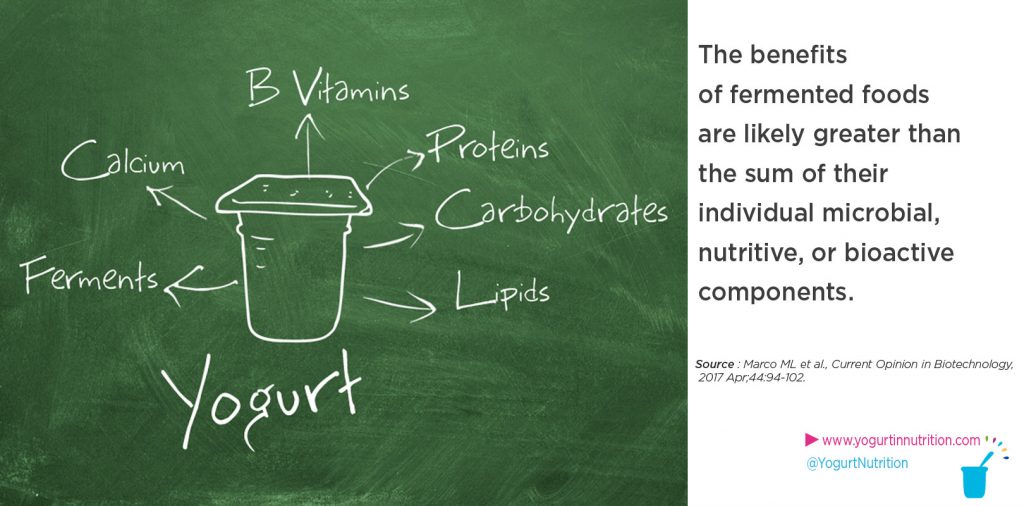
Paradoxically, observational studies indicate that consumption of fermented dairy such as yogurt is inversely related to incidence of CVD and diabetes, whereas unfermented dairy is more neutral.
[click_to_tweet tweet=”Inverse associations were found between total fermented (included sour milk products, yogurt or cheese) with mortality and risk of CVD. Analysis of total #fermenteddairy of cheese shown a lower 2% lower risk of CVD #yogurt2018″ quote=”Inverse associations were found between total fermented (included sour milk products, yogurt or cheese) with mortality and risk of CVD. Analysis of total #fermenteddairy of cheese shown a lower 2% lower risk of CVD #yogurt2018″]Dairy attributes of calcium, protein and other bioactive components may modify the effects on LDL cholesterol, triglycerides, blood pressure and energy balance (thereby helping to reduce cardiovascular risk), making dairy saturated fat have a different effect to the SFAs in meat fat. Probiotics from fermented dairy products have also been shown to have beneficial effects on blood pressure, insulin resistance and promote satiety.
Astrup concludes that both full fat and fat-reduced yogurt and other fermented dairy products reduce risk of CVD, type 2 diabetes and certain cancers, and should be part of a daily diet.
Is yogurt just a nutrition powerhouse – or something more?
Fermented dairy foods such as yogurt and kefir are becoming increasingly popular, and their consumption keeps increasing. These foods offer benefits in terms of nutrients such as a wide range of minerals and vitamins. But, is this just about nutrients, or is there something special and inherent in yogurt that goes beyond basic nutrition?
It is known that fermented foods provide an added benefit to nutrition: they have the ability to deliver a variety of live bacteria to the gut. Different products offer different levels of effectiveness, depending on the type of food, how it is manufactured and its shelf life.
Robert Hutkins (Food Science and Technology Department at University of Nebraska-Lincoln, USA) highlighted that RCT studies suggest that fermented foods may confer several health benefits:
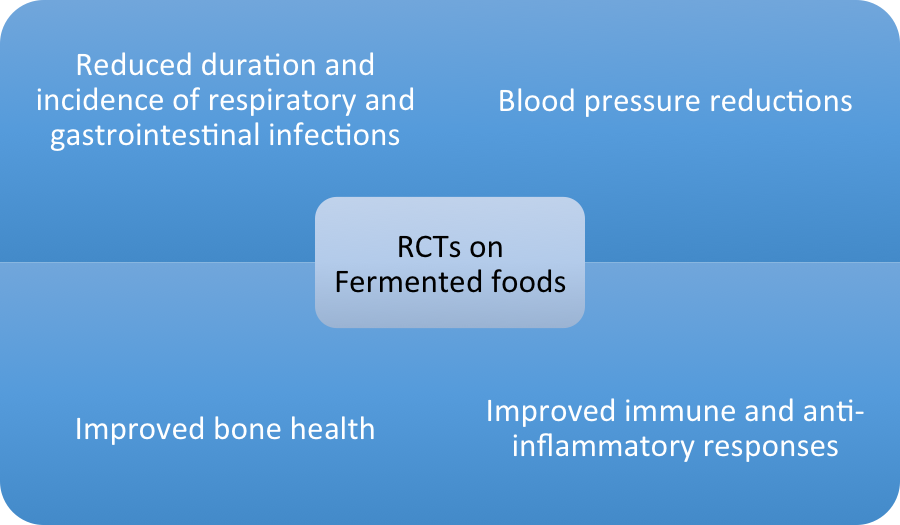
Further, the bacteria in yogurt have repeatedly been shown to improve lactose digestion in malabsorbers, and regular intake of cultured milk products, such as yogurt, and especially those with probiotic bacteria, have been shown to increase numbers of gut bifidobacteria. Regular consumption of live yogurt also appears to boost the numbers of lactobacilli in the gut.
[click_to_tweet tweet=”Regular consumption of live #yogurt appeared to boost the numbers of #lactobacilli in the gut was associated with a slight increase in microbial diversity may alter the function of the existing resident bacteria #yogurt2018″ quote=”Regular consumption of live #yogurt appeared to boost the numbers of #lactobacilli in the gut was associated with a slight increase in microbial diversity may alter the function of the existing resident bacteria #yogurt2018″]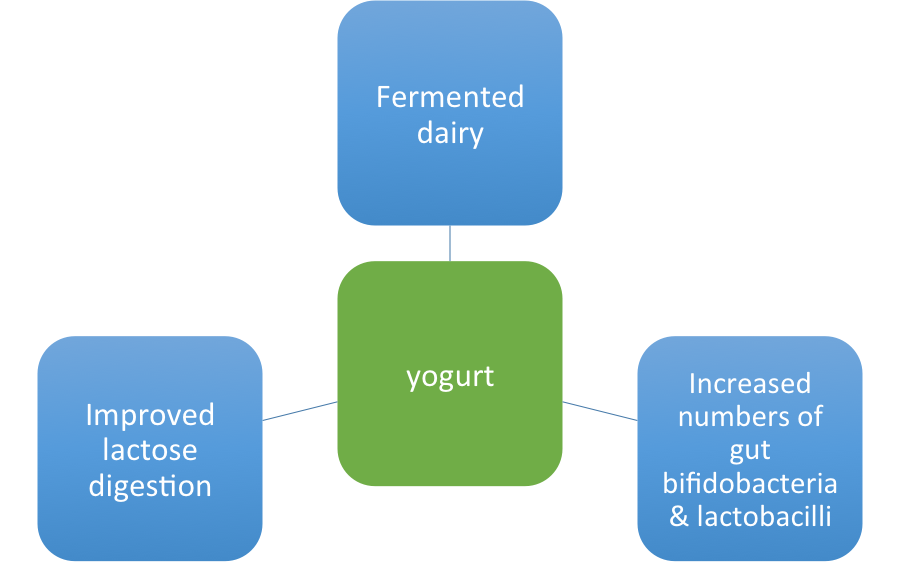
Hutkins and his team have developed a synbiotic (probiotic + prebiotic); their recent clinical study showed that gut permeability could be improved by the probiotics, as well as the prebiotic and symbiotic.
These insights support the notion that there is more to yogurt than meets the eye.
Yogurt, bioactive peptides & cardio-metabolic diseases
Recent research has highlighted the association between yogurt consumption and reduced risk of cardio-metabolic diseases (CMDs). People who regularly eat yogurt tend to have healthier lifestyles: for example, they are more likely to have better overall nutrient intakes, exercise regularly, and do not drink alcohol excessively.
Yogurt is nutrient-dense, and it has been suggested that it can lower weight gain and thereby reduce risks of CMDs. It also seems that live bacteria in yogurt can interact with the gut microbiota and this may play a role in reducing inflammation, which is a major driver of CMDs in obesity.
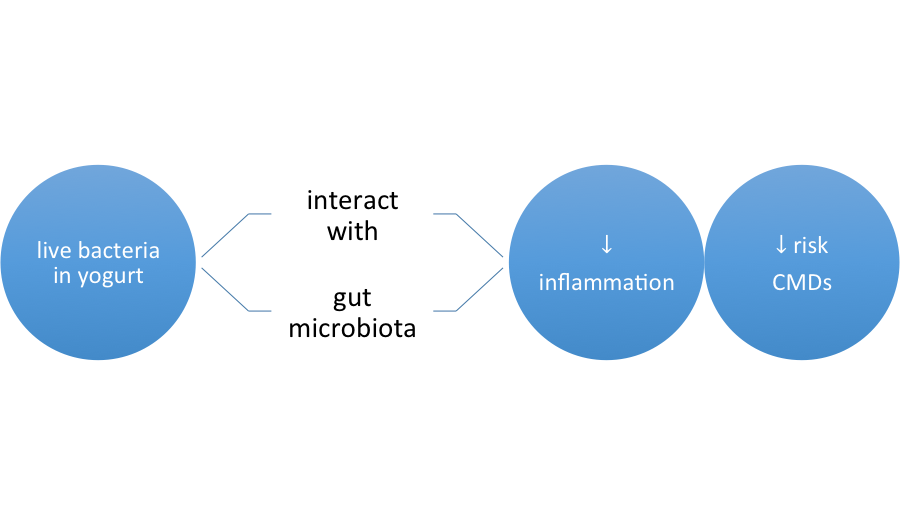
Andre Marette (Laval University, Quebec) shared recent evidence suggesting that peptides released during fermentation of dairy products act as key immune-metabolic factors and can impact the gut microbiota. Fermentation with bacterial strains generates bioactive molecules that may contribute to the beneficial effect of yogurt on cardio-metabolic health. He reviewed the challenges in identifying potential mechanisms of yogurt’s beneficial effects and offered his perspective on future research that could validate the proposed role yogurt could play in protection against CMDs.
[click_to_tweet tweet=”Live bacteria in #yogurt can interact with the gut #microbiota and in this may play a role to reduce inflammation which is a major driver of CMDs in obesity #yogurt2018″ quote=”Live bacteria in #yogurt can interact with the gut #microbiota and in this may play a role to reduce inflammation which is a major driver of CMDs in obesity #yogurt2018″]Challenging dietary guidelines
Conventional dietary guidelines recommend lower fat versions of dairy products to help reduce intakes of calories and saturated fats. Yet, longitudinal studies evaluating habitual intakes of dairy foods, suggest that the effect on conditions such as CVD and type 2 diabetes appear to be more related to the type of dairy rather than the SFA content. Dariush Mozaffarian (Dean and Jean Mayer Professor of Nutrition and Medicine, Tufts, USA) explains that these findings suggest that health effects of dairy may depend on multiple complex characteristics, such as probiotics in yogurt and fermentation of dairy products.
Yogurt appears to protect against long-term weight gain; when sugar-sweetened, approximately half the benefit appears lost. Studies suggest that probiotics and probiotic-microbiome interactions play a key role in metabolic protective effects of yogurt.
Greater dairy fat intake is associated with lower risk of T2D and CHD. Could this be a result of the dairy fatty acids? Or other factors?
What we do know is that dairy products are a diverse set of foods, with complex effects that vary according to the food type. There may be a range of intricate mechanisms regarding probiotics and fermentation processes that play a beneficial role in cardio-metabolic health.
[click_to_tweet tweet=”The cardiometabolic effects of specific #dairy foods and #fermented products represent promising areas for further investigation. #yogurt2018″ quote=”The cardiometabolic effects of specific #dairy foods and #fermented products represent promising areas for further investigation. #yogurt2018″]Mozaffarian argues that there are two main issues with current dietary recommendations on dairy products:
- Guidelines are based largely on calcium, vitamin D and fat content, rather than their potential to have cardio-metabolic benefits. They emphasise the choice of low fat dairy based on the theory of their influence on obesity and CHD instead of empirical evidence.
- Dairy foods are lumped together rather than being individually evaluated according to their effect on long-term health. The current science supports consuming more yogurt, and until the evidence suggests otherwise, the choice between low or full fat yogurt ought to be down to personal preference.
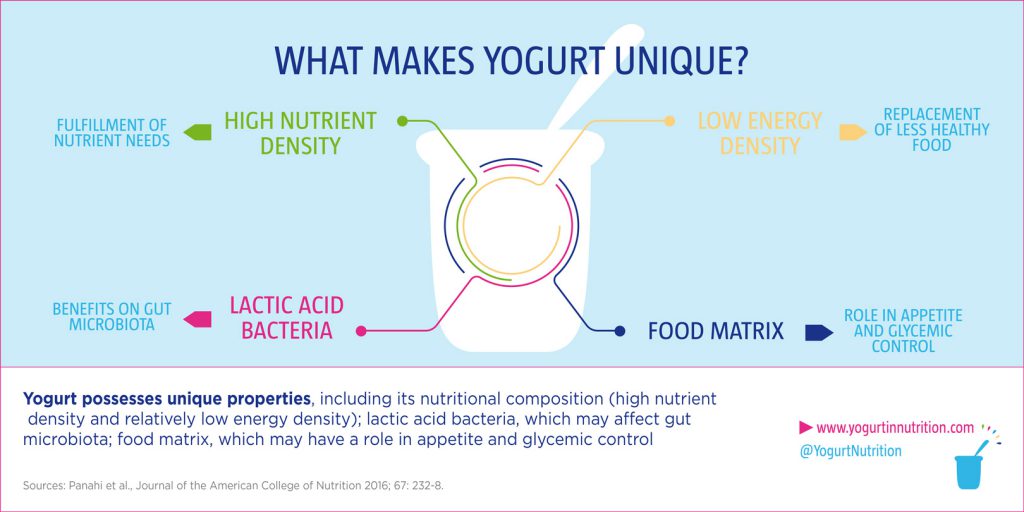
So, is low-fat dairy better? The evidence suggests perhaps not…and there is more to yogurt than meets the eye; simply looking at nutrients or probiotics in isolation doesn’t adequately represent the inherent benefits.
Yogurt is more than the sum of its parts !
Written by Azmina Govindji (@azminanutrition)



